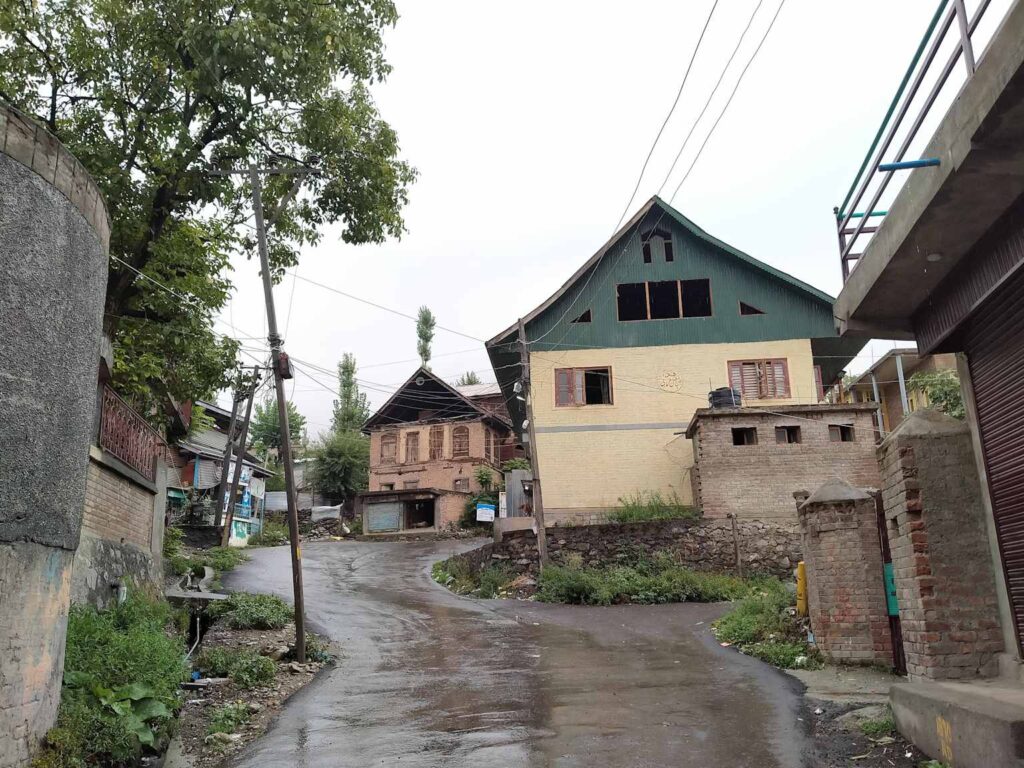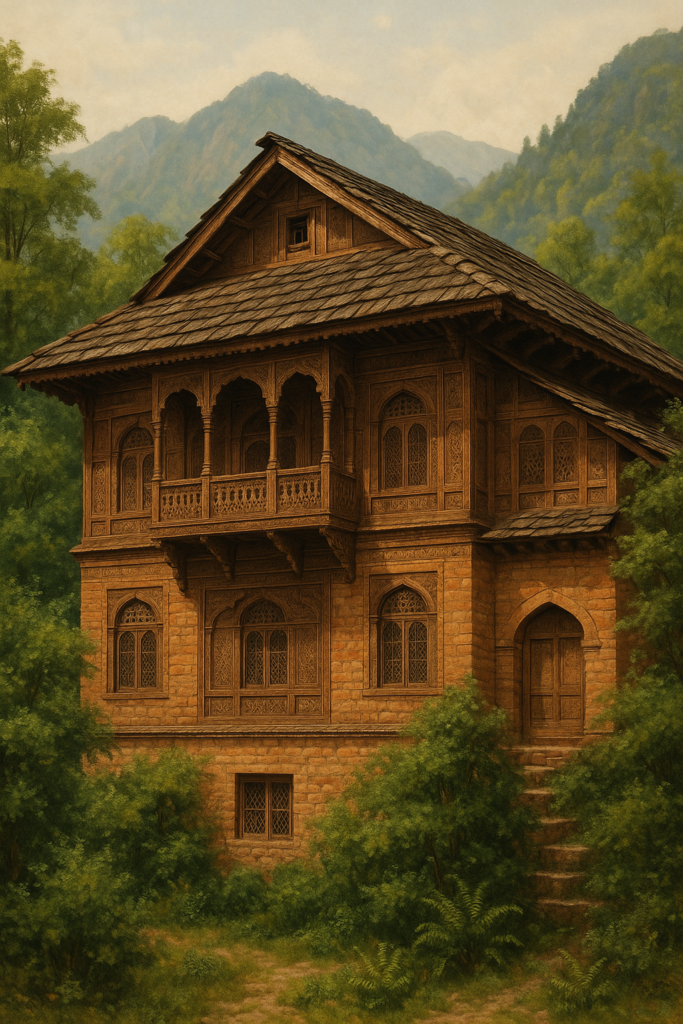A quiet Kashmiri village becomes a mirror of memory, where every tree, kite, and biscuit tells a story of a childhood slipping through time.
By Peer Mohammad Amir Qureshi
The gate groaned open beneath my hand, a rusted hinge releasing a sound that felt like memory itself—familiar, intimate, and heavy with time. I had only come to the village for milk, a routine errand on a quiet day. Yet what greeted me beyond that gate was anything but ordinary. The courtyard burst with the kind of chaotic, joyful energy only children can create. Barefoot and breathless, they chased a cricket ball through plumes of golden dust, their laughter high and sharp, piercing the stillness like sunlight through shutters. Scooters zipped past like overexcited bees, zigzagging through the mayhem, their engines purring an anthem of carefree thrill.
These children had just arrived at their nanihaal—their maternal haven—and it showed in every movement, every giggle, every streak of dust across their cheeks. There was a lightness to their steps, a purity to their joy. Watching them, something stirred in me, ancient and tender. A tug from within, as if some long-dormant thread had been pulled tight again. I knew that feeling. I had lived it.
As a child, the very mention of Babawayil—my mother’s ancestral village tucked in the emerald lap of District Ganderbal—was enough to set my heart racing. My brothers and I would clamor for a chance to visit, each of us vying like pilgrims for a single seat on a sacred journey. “One at a time,” our parents would say, steadying our excitement with measured calm. And when my turn finally came, it was as if an entire orchard had bloomed inside my chest. This wasn’t a vacation. It was a return to a place where love was not just felt—it was tasted, breathed, and lived.
Babawayil was never just a dot on the map. It was a realm suspended between myth and memory. Wrapped in cherry orchards and guarded by ancient walnut trees, the village was a gentle rebellion against a world too often ruled by convention and greed. It held a rare dignity. It was, proudly and quietly, a dowry-free village—a stance both radical and beautiful in its simplicity. Here, marriages bloomed from love alone. No price tags, no transactions—only union and mutual respect. The villagers carried this ethos like second nature, their lives flowing with the clarity of the mountain streams that once traced the village’s edges.
At the heart of this world stood a house—not grand, but resolute. A two-storeyed structure whose tin-clad wooden gate rattled like an old storyteller waking from slumber. Just beyond it, a modest cowshed rested on a raised mound, home to sleepy goats and a watchful cow gently nuzzling her calf. Walnut trees stood sentinel over the compound, their canopies heavy with age and stories. The verandah, wide and worn, stretched out like a stage where mornings brewed in tea and evenings dissolved into starlit stories.
To one side, nature had performed its quiet magic. A grapevine crept poetically over wooden beams. Cherry trees, flushed crimson in the summer heat, stood like blushing sentinels. And then there was the old walnut tree, immense and noble, its branches drooping toward the earth as if in prayer. From the kitchen window, the view was a painter’s dream—clusters of grapes gleaming like amethysts, the cherry trees swaying in silent conversation with the breeze. Once, this garden had been a concert hall of birdcalls—nightingales and sparrows darting between branches, feasting, singing. Now, the trees stand still. The birds are gone. Displaced by towers that blink red in the dark and by seasons that no longer arrive on time. Progress, it seems, came at the price of song.
My grandfather, Mohammad Shah—whom we all called Baba—remains the central figure in these memories. A man of calm authority and boundless kindness, he served as the village imam. But to us, he was the heart of the house. His soul flowed like the Branan Tal stream he loved, steady and clear. I remember him gently rebuking my grandmother when she shooed birds from the grapevine. “Let them be,” he’d say, eyes crinkling with his wise smile. “They have a right to eat too.” In those few words, he taught us more about generosity than any sermon ever could.

And oh, how he made the ordinary extraordinary. He’d bring home coconut biscuits wrapped in brown paper—cheap by any standard, yet to us, they were treasure. Their crumbly sweetness still dances on my tongue, unchallenged by any pastry since. My grandmother, no less magical, had a sandook—a wooden trunk that groaned with the weight of time. From its depths emerged chocolates, roasted peanuts, and stories. That sandook was more than furniture; it was a portal to a time when love was measured in wrapped sweets and quiet gestures.
Kite flying was our high religion in Babawayil. It was passion, performance, and prayer all rolled into one. I remember pestering my grandmother until she marched me to Hafeez Aapa’s house. Her son placed a kite in my hands—vibrant, trembling, alive. I carried it home with reverence. When it soared above the rooftops, it felt as though my heart had unmoored itself and gone flying with it.
Food barely mattered in those days. Who could sit down to eat when there were cousins to chase, games to win, and errands of great consequence—like visiting Amm Soab’s shop? A crooked staircase led to that hallowed place, and every creak of wood beneath my feet was music. The air inside was a heady mix of sugar, spice, and memory. My cousin Rukhsana Didi always accompanied me under strict orders not to let me wander alone—there were dogs, after all. The shopkeeper, grinning, would tease, “When did this one from Serch arrive?” I would grin back and lose myself among the glass jars that held biscuits like precious stones.
Three uncles lived under that roof, and each claimed me like a prized guest. Dinners were debated like matters of state: “He’s eating with me—I got mutton!” “No, tonight’s chicken is mine!” Their mock arguments were threaded with real affection, a warmth that blanketed the house. In the garden, they’d take me cherry-picking, guiding my hands to the right trees—planted by Baba for each of his daughters. Even in fruit, there was respect, a hierarchy rooted in love.
Evenings were the most sacred. As dusk fell, my grandmother would call me inside with hushed warnings about spirits or soldiers. Inside, the kitchen glowed. Baba and my uncles gathered like planets around a fire, their voices weaving tales of jins, politics, and dreams. Those conversations were our Netflix, our news, our lullabies.
But time, like the Branan Tal stream, has thinned. The kites no longer rise. The sandook sits closed. Amm Soab’s shop is a hushed relic, its shelves empty, its scents vanished. My uncles have their own homes now. The laughter, once echoing through shared spaces, is scattered across distances. The orchard still stands, but the fruit is quieter. The verandah, once our theater, now watches in silence.

Sometimes, in the quiet hours of night, I wonder: Did we grow up, or did we simply drift away? Would the boy I once was recognize me now? I long for a single moment—to descend those old stairs, to hear the creak, to chase that kite once more, to hear the shopkeeper call me “the one from Serch” just one last time.
All that remains now is memory—fragile, yes, like those old biscuits, softening under time’s weight. But sweet. Sweet enough to linger forever.
The views expressed in this article are solely those of the author and do not necessarily reflect the opinions or views of this Magazine. The author can be reached at [email protected]
Leave a Reply